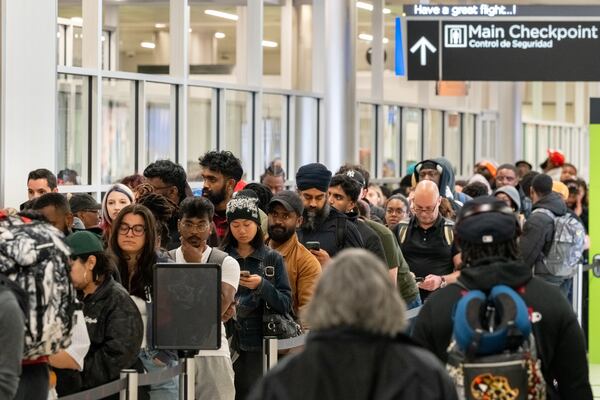The federal government shutdown has entered the record books, becoming the longest such stalemate in history.
Wednesday marked the shutdown’s 36th day, surpassing the previous 35-day benchmark that took place during President Donald Trump’s first term.
Here are some of the ways the shutdown is being felt in Georgia:
Air travel
At the world’s busiest airport, callouts by Transportation Security Administration agents on a few busy weekend days have prompted some security lines to balloon at peak moments. But Hartsfield-Jackson Atlanta International Airport has so far been spared any major disruption from the shutdown.
U.S. Transportation Secretary Sean Duffy has continued to warn that this could change, particularly when it comes to air traffic control, which is already short-staffed.
Ricky Smith, general manager of the Atlanta airport, told The Atlanta Journal-Constitution in a statement: “Despite the hardship created by federal employees working without pay, TSA and FAA personnel continue to show extraordinary professionalism to ensure that travelers remain safe and Atlanta stays connected to the world.”
But Atlanta-area air traffic controllers and other FAA employees have recently demonstrated their frustration to passing travelers, urging them to call their politicians to demand action.
Credit: Ben Hendren
Credit: Ben Hendren
Food assistance
Federal money for Supplemental Nutrition Assistance Program benefits ran dry Saturday. Roughly 1.3 million Georgians — or 1 in 8 people in the state — rely on food stamps.
The Trump administration has said it would obey a federal-court decision and tap emergency funds to make at least partial payments on SNAP benefits. But Trump fueled more uncertainty when he said in a social media post Tuesday that payments would not be made until the shutdown ends.
Gov. Brian Kemp has maintained he will not tap the state’s $14.6 billion rainy day reserve fund to fund the program.
Credit: Hyosub Shin/AJC
Credit: Hyosub Shin/AJC
Federal workers
The shutdown has meant no paychecks for most of the more than 100,000 federal workers in Georgia.
The state is home to 106,467 federal employees, which accounts for about 2% of the state’s total nonfarm employment, according to data compiled by the Georgia Budget and Policy Institute.
The U.S. Centers for Disease Control and Prevention is the largest federal employer in metro Atlanta.
Small business
The shutdown has meant small businesses have been unable to access Small Business Administration loans for hiring and expansion. In Georgia that translates into $35 million a week, according to SBA Administrator Kelly Loeffler.
The impact has been felt by recipients and lenders.
Access to Capital for Entrepreneurs, a Georgia-based community lender that also gives out SBA loans, has been “broadly affected” by the shutdown, the organization’s CEO, Martina Edwards, said in an email to the AJC.
“Currently, the SBA is unable to approve new loans except for disaster loans, leaving SBA lenders and small business owners who were in the pipeline for capital in a holding pattern,” Edwards wrote.
Labor data
The shutdown has not only affected federal departments but also state government agencies and industry groups that rely on federal data.
The U.S. Department of Labor has not published federal jobs data since the start of the shutdown, and that has clouded the picture for economists and policymakers who scour federal data for clues about the state of the economy.
In Georgia, for instance, the state Department of Labor did not publish its September jobs report.
“Because of the ongoing federal government shutdown, Georgia’s monthly statewide labor market report originally scheduled for Thursday, Oct. 16, 2025, has been postponed until federal funding is restored,” the state labor department said at the time. “We will share additional updates as soon as they become available.”
Higher Education
Georgia Tech said the impasse has university officials looking for ways to help preserve cash and keep campus running.
Georgia Tech also said the shutdown is delaying federal research grant payments, which represent more than $100 million of the school’s monthly expenses.
The Midtown Atlanta school has created a federal shutdown working group that “continues to closely monitor daily cash balances and plan for the possibility of additional mitigation measures if the shutdown continues through the fall semester.”
Meanwhile, the University of Georgia is asking project managers to “postpone any non-essential purchases” until the government reopens.
No permanent staff should be furloughed, and graduate students working on federal research projects will continue to receive financial support, the school said.
While UGA says it “can maintain the status quo for now,” it may “need to implement more specific process adjustments to support federally funded projects” if the shutdown continues past November.
Head Start
Head Start programs serving more than 6,500 Georgia children did not receive the annual funding they were expecting Saturday.
At least two providers had to close because of the shutdown, the National Head Start Association confirmed. They are Action Pact, which operates more than a dozen Head Start locations in rural Georgia, and East Coast Migrant Head Start Project, which operates one campus in Valdosta.
The Action Pact closures mean 548 Georgia kids are without services like child care and free meals, WABE reported.
Providers in metro Atlanta and Augusta were able to secure an $8 million bridge loan from the Community Foundations for Greater Atlanta and the Central Savannah River Area to keep operating for 45 days.
The loans are just a “temporary reprieve,” said Lauren Koontz, president and CEO of YMCA of Metro Atlanta, the state’s largest Head Start provider.
Staff Writers Cassidy Alexander, Jason Armesto Mirtha Donastorg, Caleb Groves Ariel Hart, Emma Hurt, J. Scott Trubey contributed to this report.
About the Author
Keep Reading
The Latest
Featured




